The first page opened with a poem selected “by Mrs. Pettinos,” titled “The Sun and the Wind,” followed by a conversation about the meaning of the 4th of July and how an Indian School student might be influenced to extend his time at the school instead of returning to the reservation. Page two included letters from Frank Lock (Sioux) on outing,…
Student Transfers
Transfers between schools.
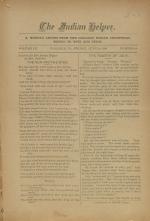
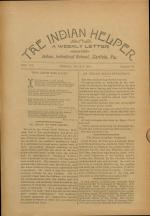
A description of this document is not currently available.
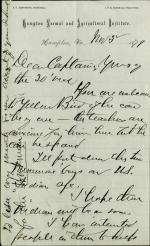
Samuel Chapman Armstrong of the Hampton Institute writes to Richard Henry Pratt about transferring some students, including Menominee boys and Yellow Bird, to Carlisle. Armstrong also discusses a visit to Carlisle on a trip north.
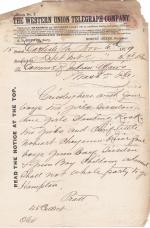
Telegram from Richard Henry Pratt noting the arrival of Agent Crissey with Sisseton, Standing Rock, and Cheyenne River Sioux children, Green Bay Menominee children, and Chief Little No Heart at Carlisle. Pratt suggests that all these children should be sent to the Hampton Institute.
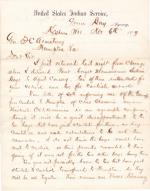
Richard Henry Pratt forwards to the Commissioner of Indian Affairs a letter, sent to General Samuel Armstrong of the Hampton Institute by Green Bay agent E. Stephens. Stephens requests that two students just sent to Carlisle, Joseph Wishecoppy [Wisecoby] and Moses Nonway, be sent to Hampton to join two other recently enrolled Menominee students…
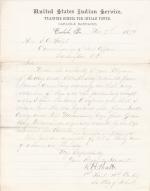
Richard Henry Pratt informs Commissioner of Indian Affairs Ezra Hayt that, at the request of Hampton Institute director General Samuel Armstrong, six Sisseton Sioux children and two Menominee boys from Green Bay, Wisconsin will be retained at Carlisle. Their addition increases the school's population to 158.
Note: The two Menominee…
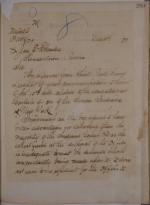
Commissioner of Indian Affairs Ezra A. Hayt's letter to James E. Rhoades in response to a letter Rhoades sent to Captain Richard Henry Pratt requesting that he transfer a Seneca student to the Carlisle Indian School. Hayt denied the request on the grounds that the Seneca student has "better advantages" than most Indians and that the office has…
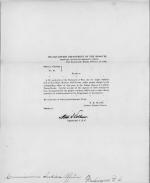
By command of Brigadier-General Pope, Assistant Adjutant-General E. R. Platt orders that two Lipan Apache children at Fort Hays, Kansas be sent to the Carlisle Indian School.
Note: This item was copied from U.S. National Archives microfilm reels (M234), which were filmed from the original documents found in Record Group 75, Entry 79, "…
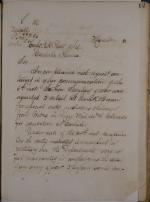
In this letter the Commissioner of Indian Affairs R. E. Trowbridge was responding to a from Indian Agent A. B. Ludlam of the Pima and Maricopa Agency's request for the education of three Pima boys at the Hampton Institute instead of at Forest Grove Industrial Training School in Oregon. Trowbridge explains that the climate is not much colder…
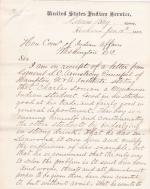
Green Bay Agency Indian Agent E. Stephens proposes transferring Charles Somains from the Hampton Institute to the Carlisle Indian School rather than having him return home. Stephens indicates that this is likely the best path for helping Somains and his mother.
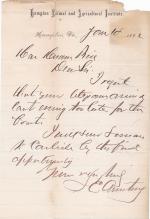
S. C. Armstrong acknowledges that he will transfer Charles Somains to Carlisle at the earliest opportunity from the Hampton Institute.
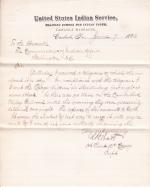
Richard Henry Pratt forwards a copy of a telegram that Osage children were going to arrive at Martinsburg on June 8, 1882. Pratt writes that he met the children at Martinsburg and due to the lack of a train back to Carlisle they were forced to stay the night at Martinsburg incurring an additional expense which Pratt asks to cover on his…
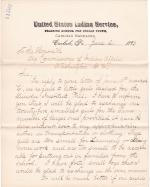
Richard Henry Pratt replies to a letter received from the Office of Indian Affairs regarding small girls to be sent to the Lincoln Institute in Philadelphia. Pratt notes that he would be willing to send a number of young girls at Carlisle to be sent to the Lincoln Institute along with young boys if it does not impact his budget.
Pratt…
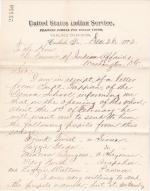
Richard Henry Pratt writes to the Office of Indian Affairs regarding a letter he has received from the Superintendent of the Genoa School to transfer five students to Genoa when the school opens in February 1884. Pratt states that while he is willing to send the students he does not believe the transportation costs should come out of his…
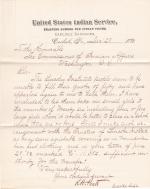
Richard Henry Pratt notes that the Lincoln Institute has appealed to him to help them fill their quota of students. As a result he proposes to transfer 26 girls including the small girls at Carlisle and four or five large girls who would be better served in a single sex school.
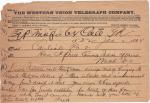
Richard Henry Pratt informs the Office of Indian Affairs that the Lincoln Institute wants 27 students. He also asks if there is any trouble with the reimbursement to his funds that separate vouchers be taken for the Lincoln Institute for those from Arizona which would cover orders from June.
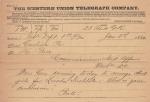
Richard Henry Pratt informs the Office of Indian Affairs that Mrs. Cox is coming to the Carlisle Indian School to arrange for transferring girls to the Lincoln Institute. Pratt asks for the conclusions from the Office of Indian Affairs about authorizing the transfer.
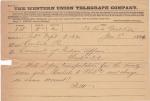
Richard Henry Pratt asks of the Office of Indian Affairs if he should pay for the transportation of 27 girls to the Lincoln Institute.

These materials include a cover letter and Descriptive Statements of Pupils regarding 27 children transferred to the Lincoln Institute in Philadelphia, Pennsylvania from the Carlisle Indian School. Those children, from a variety of Nations, had previously been sent to Carlisle.
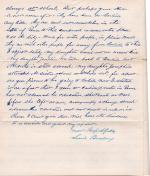
Louis Bourdeaux requests that his daughters Josephine and Martha be transferred from the Carlisle Indian School to Avoca. Bourdeaux writes that due to the outing program his daughters have rarely been at Carlisle and have instead been servants in various homes throughout Pennsylvania and so has not advanced her education.
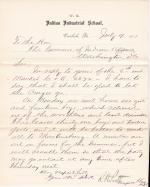
Richard Henry Pratt references a letter from the Bureau of Indian Affairs regarding the Osage students at the Carlisle Indian School. Pratt notes that he has already returned 13 students and can transfer the remaining 43 students to Martinsburg.
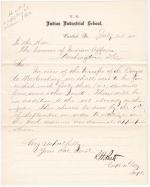
Richard Henry Pratt requests an additional 43 students to make up for the transfer of the Osage students to Martinsburg. He notes this is in addition to the 108 students that have already been authorized.
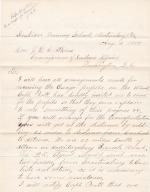
P. H. Bridenbaugh notes that the arrangements have been made for receiving Osage students being transferred from the Carlisle Indian School. He notes that in calculating the distance it is important to add an additional 22 miles on the Hollidaysburg Branch Road.
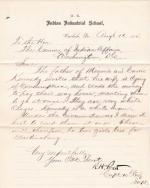
Richard Henry Pratt informs the Office of Indian Affairs that the father of Minnie and Carrie Kennedy has sent money for their return. Pratt writes that be believes it best to return the two students and therefore there will be two less students to transfer to Martinsburg.
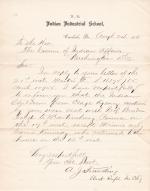
Alfred John Standing informs the Bureau of Indian Affairs that the Osage students were sent with P. H. Bridenbaugh to Martinsburg, Pennsylvania except for Carrie and Minnie Kennedy who were returned to their home.
